Direct Impact
By the Numbers
InsideClimate News serves almost 4 million annual website users and a social media audience of more than 220,000 followers. We also deliver daily and weekly newsletters to more than 92,000 subscribers containing our original stories – breaking news, features and in-depth investigations – as well as a daily aggregation of essential climate headlines from around the web curated by our staff.
Our work is indispensable reading for influencers in the climate and energy space, including:

Big Stories: Three Examples

The Dilbit Disaster (2012)
Winner, Pulitzer Prize for National Reporting
In July 2010, an undetected pipeline rupture released more than 1 million gallons of oil into the Kalamazoo River. The spill triggered the most expensive cleanup in U.S. history – more than 750 million dollars – that dragged on for years. It was a notable spill because the underground pipeline was carrying diluted bitumen, or dilbit, from the oil fields of Alberta. When the spill happened, media outlets were still focused on the Deepwater Horizon blowout in the Gulf of Mexico that had yet to be capped.
Our team was able to understand the significance of the Kalamazoo accident and spent eight months on an investigation that turned into a 10-part series. Our work won the 2013 Pulitzer Prize for National Reporting. The Washington Post and The Boston Globe were runners up. At the time, ICN had a staff of six and an annual budget of about $550,000.
Our project has had an enduring impact. We introduced the word “dilbit” into the media lexicon. We trained a spotlight on one of the dirtiest hydrocarbons on the market, which was flowing in ever increasing quantities into the lower 48, and on pipeline safety. Dilbit is especially corrosive and much of our pipeline system was old and in disrepair, ripe for further disaster. The series was instrumental in raising the public profile of the Keystone XL pipeline, and the controversy surrounding its proposed construction, which we covered closely, too.

Exxon: The Road Not Taken (2015)
Finalist, Pulitzer Prize for Public Service
In 2015, after eight months of investigation, ICN released a nine-part history of Exxon’s engagement with the emerging science of climate change. Our reporters exposed how Exxon conducted cutting-edge climate research decades ago and then worked at the forefront of climate denial, manufacturing doubt about the scientific consensus that its own scientists had confirmed.
“What they discovered through deep dives into company archives and interviews with former employees,” Bill McKibben has written in his latest book, Falter, “is the most consequential cover-up in human history.”
This series was named a finalist for the 2016 Pulitzer Prize for Public Service and earned national recognition from many other quarters, including the National Press Foundation, the White House Correspondents’ Association, the Robert F. Kennedy Award and the Oakes Award. It also provoked an investigation by a group of attorneys general into Exxon’s behavior. The internal Exxon documents we published provided the roadmap for their subpoena, which ultimately led to a trial for investor fraud in 2019 – the first lawsuit seeking to hold industry accountable for climate change that made it to the courtroom.
The same documents are now part of the Climate Files collection and the Climate Investigations Center archives, and continue to provide some of the strongest evidence in proliferating climate-related lawsuits seeking to hold industry accountable for climate impacts.

Harvesting Peril: Extreme Weather & Climate Change on the American Farm (2018)
Winner, John B. Oakes Award for Environmental Journalism
Farmers are on the frontline of climate change, at the mercy of worsening extreme weather. Farms also contribute to the problem. And they could help solve it—through practices that could store billions of tons of carbon in the soil while boosting farm profits. A transformation of America’s farm economy would be as profound as the revolution in the energy economy.
So why hasn’t this started to happen?
In this series of articles, InsideClimate News examined the influence of the nation’s largest farm lobby, the American Farm Bureau Federation. For two decades, the Farm Bureau has worked to defeat treaties and regulations to slow global warming, to deny the science in tandem with fossil fuel interests, and to defend business as usual, putting at risk the very farmers it represents.
Our series of stories broke open a discussion that has been festering under the surface in agricultural media. Our peers at the National Association of Agricultural Journalists named our team “agricultural journalists of the year” a coveted award. We also won the Oakes Award, a hard to win recognition for distinguished environmental journalism.
More important, our work was published six months before the unprecedented floods that devastated the Midwest in 2019, providing much-needed context for the local conversation around climate change and extreme weather that ensued. It was the first validation of our work to strengthen local environmental journalism; and at the Farm Bureau’s annual convention, the lobbying group began making concessions in its climate platform and moderating its climate policy in the face of growing pressure from its members.
Human Impact: Three Examples
Black Lung
in Wise, Virginia, a soft-spoken 77-year-old coal miner had been fighting for more than a decade for black lung benefits. He’d run into callous roadblocks thrown up by the coal company he labored most of his life for. He was hopelessly ensnared in the bureaucratic red tape of the U.S Department of Labor that had been shuffling his benefits application from one pile to another, never finding urgency in his suffering. That changed when InsideClimate News told Bethel Brock’s story. Within months of ICN asking questions about the hold up in his benefits, Bethel Brock got a surprise notification that his monthly checks would soon be arriving.
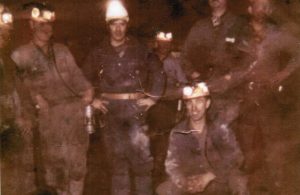
Heat Death
Officers at the Army’s Safety center in Fort Rucker, Alabama, fight an on-going battle to ensure precautions are taken to safeguard nearly 1 million personnel stationed at bases and installations in the United States from heat illness. It’s a message they lament isn’t always heard. To drive the point home, the safety center circulated to thousands of bases an investigative story by InsideClimate News that highlighted the dangerous – often deadly – consequences heat poses to military personnel. Even though the commander-in-chief of the military is openly hostile to climate discussion, to save lives the safety center saw fit to share our work.

Toxic Fumes
The people of South Portland, Maine, had lived for years with noxious fumes wafting from 120 petroleum storage tanks without ever really knowing whether they were harmful. One was a young mom who just happened to work for InsideClimate News. Her ongoing first-person narrative, launched after the EPA cited a tank farm operator for emissions violations, helped trigger air monitoring for the first time, to incendiary effect. What it revealed: troubling spikes of benzene, a known human carcinogen; naphthalene, which can cause neurological damage, and a range of heavy compounds called polycyclic aromatic hydrocarbons, some of which cause cancer. With further air monitoring now set to last through 2020, providing further health data to moms and their children, ICN’s reporting has helped galvanize pressure for more stringent environmental regulation of the tanks.

ICN at Work: Connecting the Dots
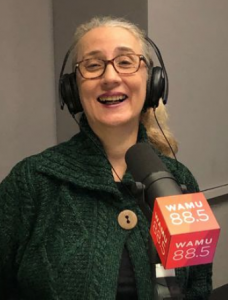
Journalists at work send a signal to all stakeholders every day: We’re watching, we have many sources, and we’ll tell the three-dimensional truth. Marianne Lavelle, our award-winning politics reporter based in Washington D.C., explains this under-appreciated aspect of her work. Here’s how she worked a story about the climate implications of President Trump’s new NAFTA deal.
The Sierra Club activist who has been working on this issue (NAFTA) said that there has been virtually no coverage of all the climate harm that is built into the new treaty. It’s a side issue for the other journalists who have been covering NAFTA. But for us, it is the main issue–and our in-depth coverage of it begins to drive home the point that climate is not an isolated issue, but is embedded in every economic, foreign policy and domestic policy decision that governments are making.
The Sierra Club, though, would not share all of the details on how the trade pact has an impact on climate. The environmental group didn’t want to talk about steel prices, for fear it would rupture the bridges they are trying to build with the labor community. And the Democrats who opposed Trump also were wary of stepping on toes. Each of the oil industry organizations and lobbyists and think tanks I reached out to also had their own take, or one narrow issue they cared about.
It takes reporting by someone who does not have a vested interest to bring all of these facets together and provide an accurate overall picture.
Network Impact
Environment Reporting Network
ICN’s environment reporting network launched in 2018. We have opened four regional hubs in two years, and have developed a network of media collaborators in each region. We provide training to reporters and ongoing consultation with their newsrooms; and we lead large collaborative projects across regional newsrooms. We also make the work of our reporters located in the region available for co-publication. Quite often, they end up on the front page of partners’ print editions, as well as online. Here is snapshot of our hubs by region.
Southeast
The network launched in 2018 when we hired James Bruggers to head up our Southeast hub. He is a veteran journalist from the Louisville Courier-Journal and highly regarded in the region. Aside from filing his own impactful stories (which frequently get picked up by other papers in the Southeast), he’s also organized two workshops for journalists from small outlets in the region. He’s worked with many of them as they published more than 40 stories over the last 18 months that otherwise may not have seen the light of day. A collaborative project Jim organized across ten partner newsrooms, called Caught off Guard: The Southeast Struggles with Climate Change, published in January 2020.
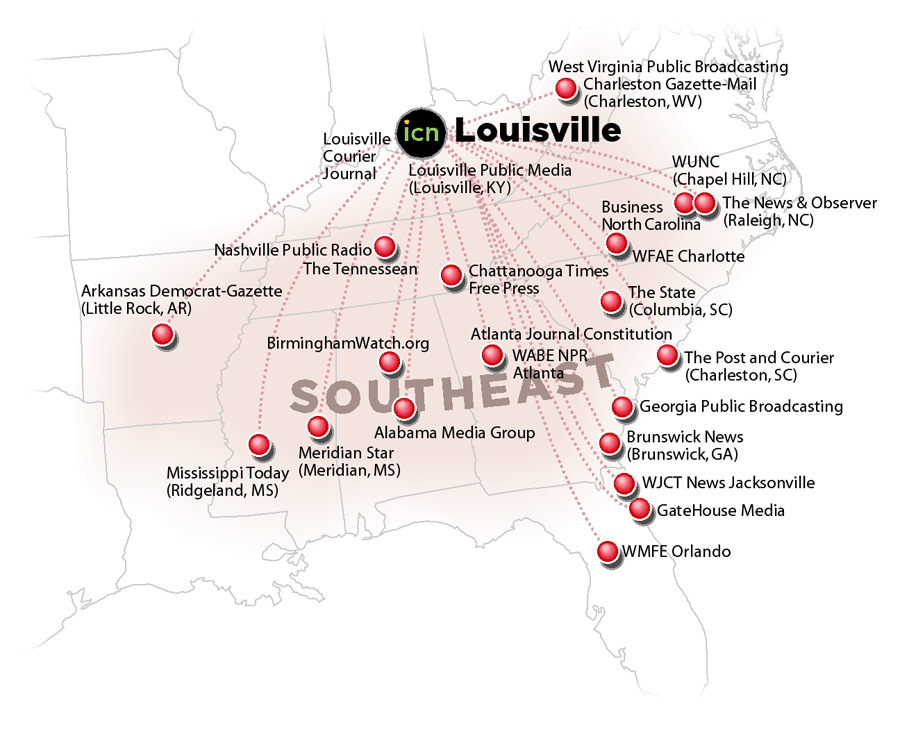
Midwest
The Midwest Hub launched when we hired Dan Gearino, based in Columbus, Ohio, to head up the regional hub. He is a veteran journalist from the Columbus Dispatch and also highly regarded in his region. He, too, organized a two-day workshop and training attended by 15 journalists from small outlets in the Midwest, and he orchestrated two multi-newsroom collaborations. Fourteen outlets came together to publish a project called Middle America’s Low Hanging Carbon. Dan organized another cross-newsroom collaboration called Unfamiliar Ground: Bracing for Climate Impacts in the American Midwest. As Jim is doing in the Southeast, he is strengthening the capacity of these regional newsrooms to cover the climate, science and the environment.
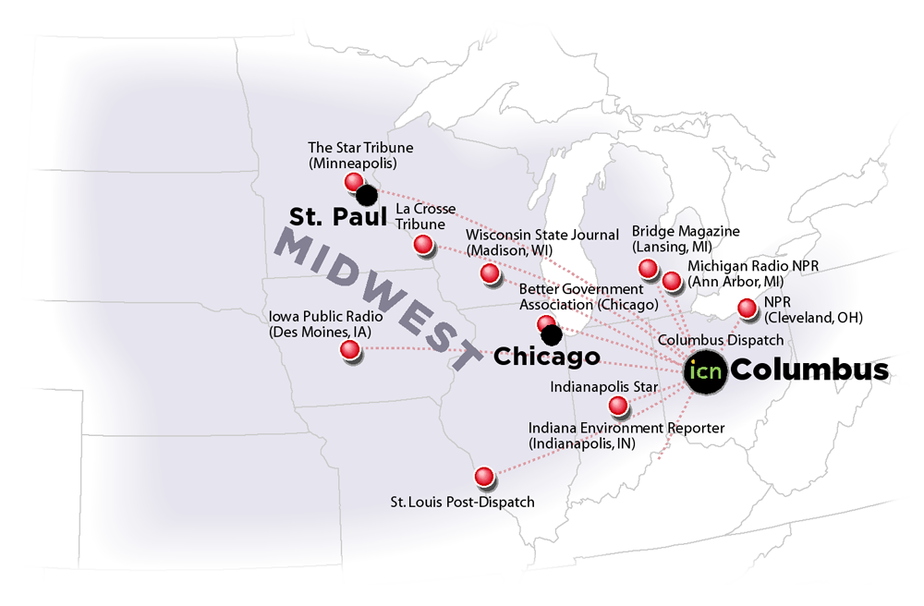
Mountain West
This regional hub launched in September 2019 when Judy Fahys joined our staff and established an ICN presence in Salt Lake City. She is another reporter highly respected in her region. She has most recently been reporting for public radio, and brings to our operation a new capacity to add to our toolkit for reaching larger audiences. She recruited fellow journalists in the Mountain West to attend an ICN workshop in collaboration with the Salt Lake Tribune, but it had to be postponed due to COVID-19.
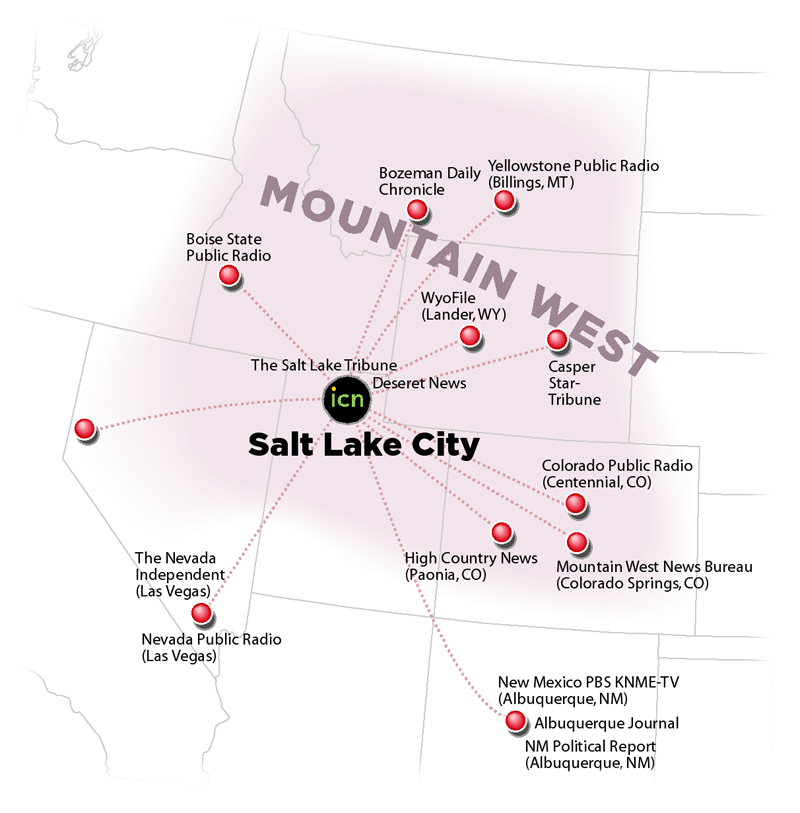
West Coast
The West Coast hub launched at the end of March 2020, when Evelyn Nieves joined our staff, just as the coronavirus was forcing a national lock down. She is the former San Francisco bureau chief for the New York Times, and also highly regarded in her region. Her focus is the intersection of agriculture and climate change, and she will be reporting from the state that is the nation’s primary supplier of fruits and vegetables. She’ll convene partners and launch collaborations as soon as social distancing can be left behind.
Florida Climate Network
A group of Florida newspapers formed a content-sharing collaborative. Even though ICN is not a Florida-based entity, we were invited to join the collaborative. The members of the collaborative are:
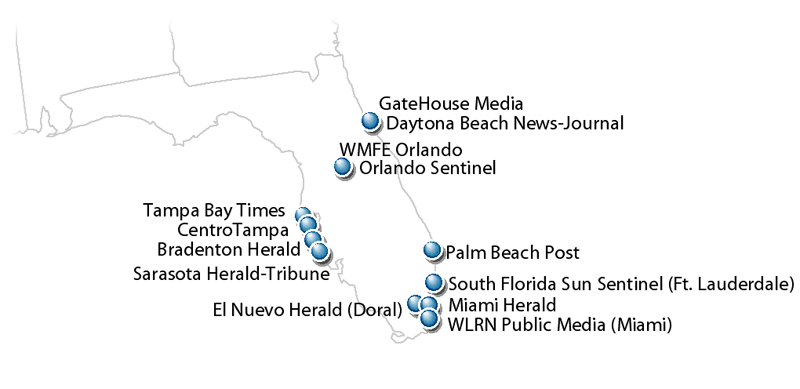
Media Partners
In addition to our network partners, ICN has worked opportunistically on projects with a variety of media partners. Sometimes we have worked on projects together; at other times, we have provided our original work for co-publication to the following outlets. Our reporters are also frequently asked by radio and television stations to provide expert analysis on climate topics on air, frequently as a result of their noteworthy published work. Outlets include:

Broadcast

Databases and Aggregators
ICN’s work is indexed by the leading searchable data collections and aggregators, which help to widely distribute our content to key audiences:
- Lexis Nexis
- Dow Jones Factiva
- Reuters Westlaw
- Climate Nexus
- Newsbank
- ProQuest
- Library of Congress
- Carbon Brief
ICN at Work: Leading Through Expertise

In October 2019, Exxon was put on trial, accused of defrauding investors over climate change risk. Nicholas Kusnetz, an ICN reporter who has covered Exxon’s risk exposure in Alberta’s oil patch, published a 4500-word curtain-raiser ahead of the trial. It was a detailed and analytical look at the issues propelling the case, loaded with background and context unavailable elsewhere. The New York Times and Energy Intelligence, an industry trade publication, were among the outlets that covered the trial. Their reporters told Nicholas how valuable his story had been to help them understand the issues and prepare their own coverage. It’s an example of how ICN has greater reach than is apparent through overt partnerships. We have an impact on readers through other publications that are informed by our work.
Systemic Impact
ICN is recognized as one of the pioneers in the wave of non-profit journalism now proliferating across the country. Our model, and our success, have been a source of inspiration and imitation. We were also one of the first news outlets to focus on a single topic and bring to it unparalleled expertise. These were positions that served us, and American journalism, very well.
It meant that the subject of climate change, which was being under-covered in the mainstream media, at least had a media champion in ICN. This was the era when the New York Times closed down its environment desk (now re-opened with full force); when NPR shrank its environment reporting staff to one (now revived and supervised by a former ICN staffer); and when other standard-bearing outlets hardly covered the beat. ICN was on the job, breaking the effective silence on one of the most consequential stories of the century.
It turned out we were also influencing the influencers. Powerful validation came in the form of a Pulitzer Prize for National Reporting in 2013. We became a go-to must-read for other journalists covering climate change, and much larger entities, like NBC News and The Weather Channel, knocked on our doors, asking to collaborate and learn from us.
We have had a defining impact on national climate coverage, and continue to break agenda-setting stories. Now we are also working in local markets, acting as a life-preserver and force multiplier for environmental journalism. Our own direct audience is becoming sizeable as well, attracted by the seriousness and quality of the journalism we offer, undiluted by clickbait, advertising or other agenda that compete with our public service mission.
Awards

There are dozens of awards in journalism. It’s the closest thing our profession has to peer review. It is an ecosystem unto itself, involving hundreds of reporters and editors across the country exchanging views on the submissions before them, and then voting to honor a handful.
There are dozens of awards in journalism. It’s the closest thing our profession has to peer review. It is an ecosystem unto itself, involving hundreds of reporters and editors across the country exchanging views on the submissions before them, and then voting to honor a handful.
ICN has won dozens of recognitions either as winner or finalist from 30 different professional organizations that honor the best achievements of America’s free press.
The awards process is another way in which ICN reaches editors and reporters all across the country every year with our best work. Our readers are professional colleagues who will be guiding and producing their own journalism on climate change from their own newsrooms.
Here’s a list of professional societies and award programs that have honored ICN.
- American Association for the Advancement of Science
- American Geophysical Union
- Aronson Award for Social Justice Journalism
- Association of Healthcare Journalists
- Deadline Club
- Editor and Publisher
- Goldsmith Prize for Investigative Reporting
- Hollywood Foreign Press Association
- Investigative Reporters and Editors
- Izzy Award
- John B Oakes Award
- Kavli Foundation
- Knight-Risser Prize
- Livingston Awards
- Loeb Awards
- National Headliner Awards
- New York Press Club
- National Press Foundation
- North American Agricultural Journalists Association
- NY State Society of Certified Public Accountants
- Online Journalism Association
- Pulitzer Prize
- Rachel Carson Environment Book Award
- Radio Television Digital News Association
- Robert F Kennedy Award
- San Diego Press Club
- Scripps Howard Foundation
- Society of American Business Editors and Writers
- Society of Environmental Journalists
- Society of Professional Journalists
- White House Correspondents’ Association
Creating and Disseminating Knowledge
Our articles provoke constant debate among civil society groups across the political spectrum. The discourse of policymakers, regulators and national security experts are informed by our reporting. We have seen Senators and Representatives cite our work on the floor of Congress and at confirmation hearings, and enter it into the official record; presidential candidates cite us in their social media streams. Our original reporting, investigations and analysis have a far-reaching impact flowing through every channel in which knowledge is disseminated and debated.
Universities
We work with schools and universities across the United States and internationally to help train the next generation of journalists. Our reporters visit classrooms, hire interns, mentor students, and speak on campus. We present ICN’s Institute for Environmental Journalism – an immersive summer journalism program for high school students – at the College of the Atlantic in Maine, and formerly, the New School in New York.

- University of Cincinnati
- University of Alaska
- Harvard School of Public Health
- Berkeley Journalism
- Vermont School of Law
- College of the Atlantic
- Columbia Journalism School
- American University in Paris
- University of Iowa
- New York University
- MIT
- Yale
- Vanderbilt
- Georgia State University
- University of Southern Maine
- Pace University
- Fordham
- Baruch College
- CUNY
- University of Colorado, Boulder
- Colorado State University
- University of Louisville
- The New School
For more information, please contact:
David Sassoon
Founder & Publisher
[email protected]
Megan Boyle
Director of Development & Marketing
[email protected]

